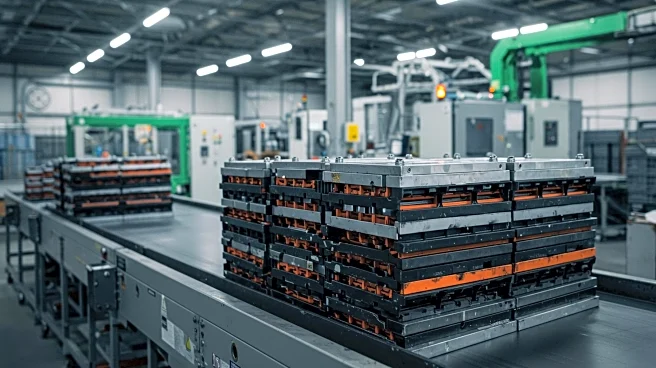What's Happening?
A recent study conducted by researchers at Edith Cowan University (ECU) in Australia has revealed that lithium batteries deemed unfit for use in electric vehicles still contain significant amounts of usable lithium. The study, published in the Journal of Environmental Management, suggests that recycling these batteries could provide a sustainable alternative to lithium mining. The researchers found that batteries ending up in landfills retain nearly 80% of their lithium capacity, which could be tapped into for reuse. The study highlights the environmental benefits of recycling, noting that it produces 61% less carbon, uses 83% less energy, and requires 79% less water compared to traditional mining methods. The researchers argue that with proper investment in infrastructure, recycling could become a profitable niche in the energy sector.
Why It's Important?
The findings of this study have significant implications for the energy sector, particularly in the context of the growing demand for lithium-ion batteries. As the global lithium-ion battery market is projected to grow at an annual rate of 13%, the ability to recycle and reuse lithium from dead batteries could alleviate some of the pressure on lithium mining, which is environmentally taxing. This approach not only offers a more sustainable method of lithium recovery but also presents socioeconomic benefits by potentially reducing the costs associated with mining and environmental degradation. Industries reliant on lithium, such as electric vehicle manufacturers, could benefit from a more stable and environmentally friendly supply chain.
What's Next?
The study suggests that for recycling to become a viable alternative to mining, significant investments in infrastructure are necessary. This would involve developing facilities capable of efficiently extracting lithium, nickel, and cobalt from used batteries. As the supply of idle batteries is expected to grow, stakeholders in the energy sector, including policymakers and industry leaders, may need to consider strategies to support the development of recycling technologies. The potential for creating a profitable niche in the energy sector could drive innovation and collaboration among businesses and governments to advance recycling capabilities.
Beyond the Headlines
The shift towards recycling lithium batteries could have broader implications for environmental policy and corporate responsibility. As industries face increasing scrutiny over their environmental impact, adopting recycling practices could enhance their sustainability credentials. Additionally, this development may influence consumer perceptions, encouraging more environmentally conscious purchasing decisions. The long-term impact could include a reduction in the ecological footprint of battery production and a shift towards more circular economic models.









